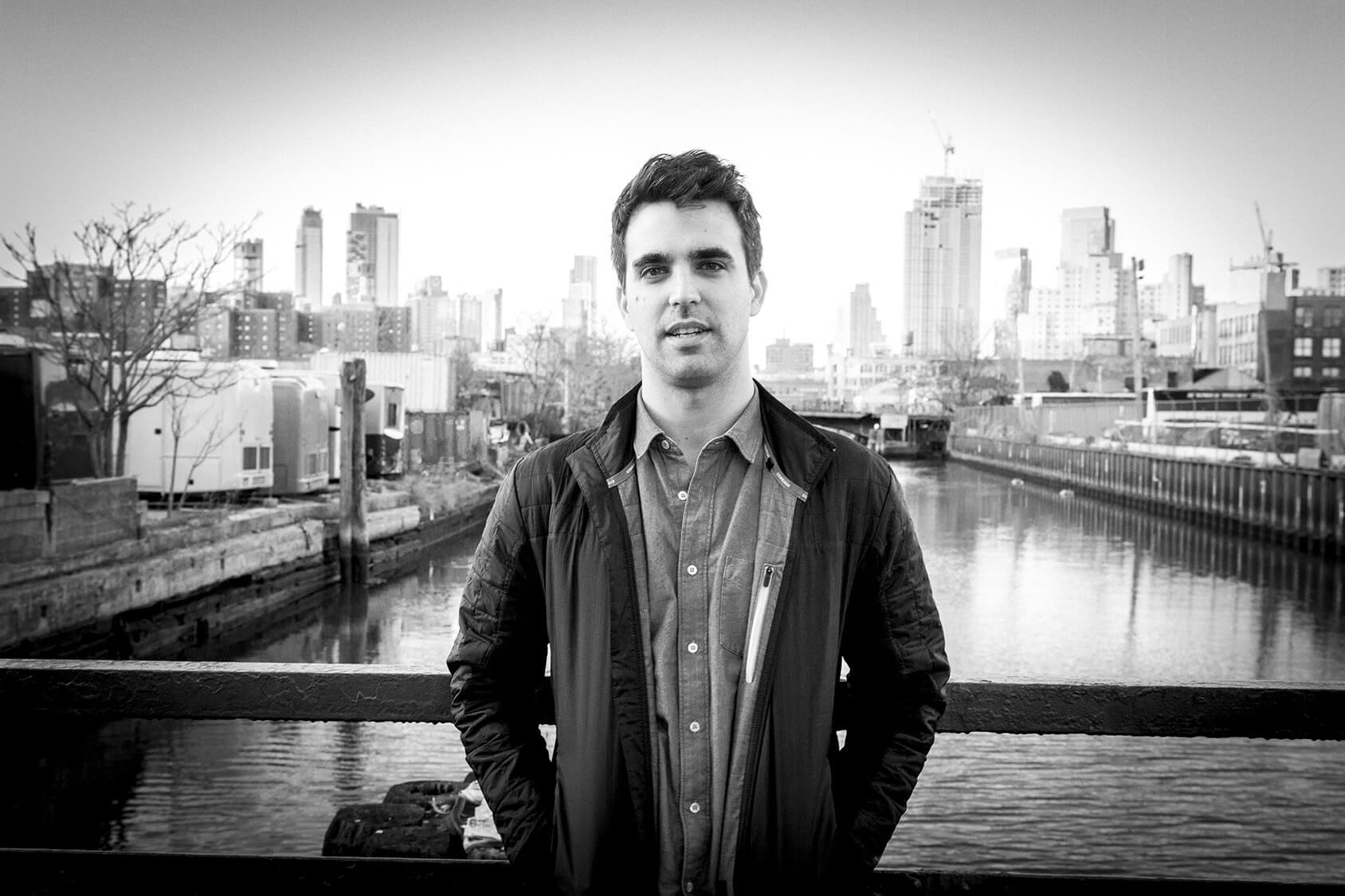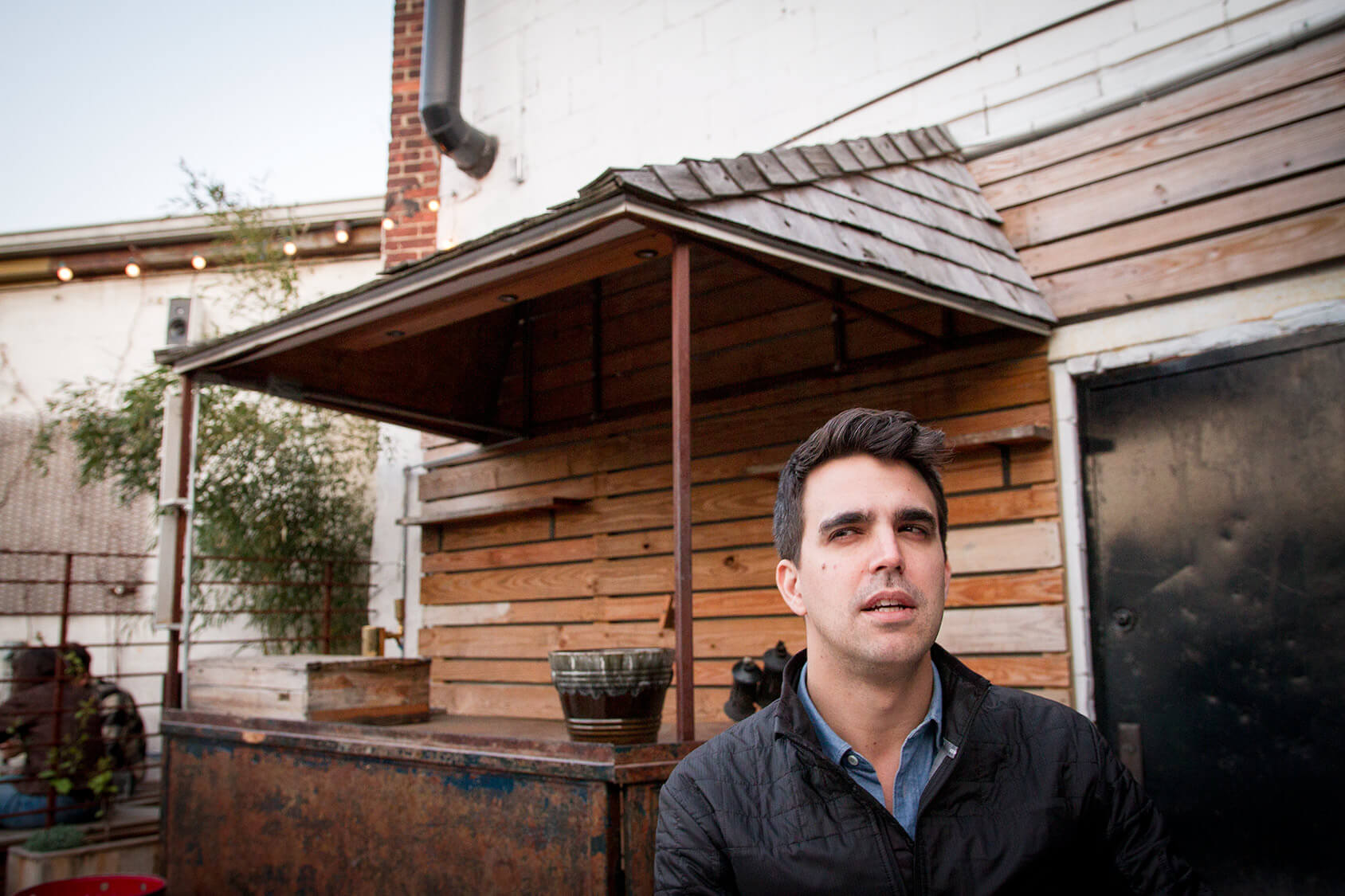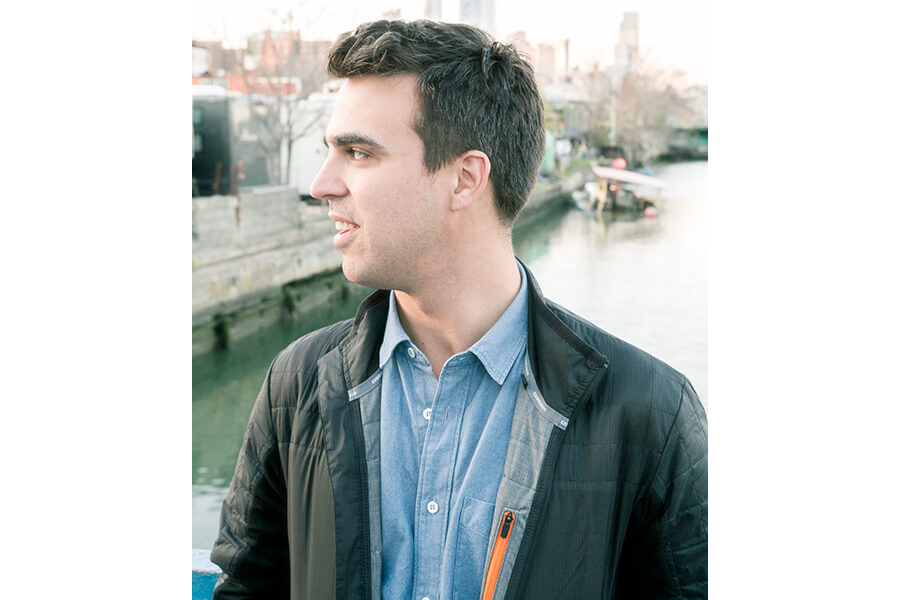People in Your Neighborhood: PJ Vogt
When I was a kid, my favorite GI Joe was Shipwreck, who dressed like a sailor and came with a tiny plastic parrot. Part of his back story was that he loved serving his country so much that he lied about being 18 so he could join the Navy early. It was noble, and selfless, but reckless in a kind of cool and sexy way.
PJ Vogt, co-host of Gimlet Media’s theoretically Internet-focused show Reply All, is podcasting’s Shipwreck. Vogt lied on his This American Life intern application so that he appeared to have finished college, when in reality he was still in his senior year. When he was accepted, he dropped out. What followed was nearly a decade of service: TAL internship followed by a long stint on WNYC’s “On The Media,” where he convinced his bosses to give him his own show, then the jump to Gimlet and his own hosting gig.
We caught up with Vogt on a recent Friday evening to talk about impossible workloads, structured talking, and life as one of America’s foremost podcasting heartthrobs.
Reply All is ostensibly a show about the Internet. But isn’t everything on the internet? What does that mean?
When we started, we thought that saying it’s a show about the internet was a really good joke that everybody would kind of get. Like, that we were going to cover everything we wanted to cover, and make it really expansive, and it felt like a game: how far away can you get and still have one finger touching the internet? And nobody got that joke or found it funny. Actually, a lot of people complained whenever we went off topic.
So, we’ll do stories like that, then we’ll do ones like the Milk Wanted one, where there’s a part of it that touches the internet, but… it’s like, here’s something we’re interested in, and it’s about people, and there’s sort of a technology part. When we do those episodes, there’s a contingent of people who are bummed out.
And you hear from them through what forum?
Twitter?
You actually read nasty @ mentions?
I read every mean thing. Everything period, but every mean thing. I mean, I’ve done it to myself.
I wake up in the morning and check my phone, and it’s like, I got three emails, a phone message, and, oh! a stranger is pissed about something. And it totally works on me. Alex sort of has an external layer of armor or ego or whatever, but I’m just totally mad about everything all the time.
When they find something you didn’t find, that’s… like when they call something out, you’re like, I understand that they don’t like that, but I’m glad that I did it. But when they catch you on something… I mean I’ll apologize, but it feels horrible. Every time we put up an episode, I go to bed just being like [extremely nervous].
It’s like when you sending a company-wide email and you keep putting it off because you’re sure something in it is wrong.
I never really have birthday parties, but this year, I was like, fuck it! This year I’m doing it, and I sent out an email to 100 people. And didn’t BCC it. It was out, and the undo button just flashed before my eyes and was gone. And then I just sent out an email that said, guys, I know there’s going to be a real temptation to do a lot of ‘reply all’ jokes on this, but please please please don’t. Please don’t. And it was just like, ffomp! For like a day and a half. And there were like people there that I didn’t want to associate my name with annoying stuff in their inbox! It was horrible. And it was the week that we were doing the microdosing episode, and I wanted to be like, sorry, I’m on acid, but I couldn’t because we weren’t telling Alex about it, and he was on the thread.
Everyone copied that idea, right?
I did see that there were a few stories about that that felt… I mean, people have covered the topic before. But there’s a few stories that felt like they did the same experiments as us. And, you never know. I mean, I sent that to Alex and was like, [angry voice] “What do you think about this!” And he was like, ‘I think there’s a lot of ideas in the world, and sometimes people have them at about the same time.’


Where are you in the media strata?
I have no idea. It’s so weird. We get little indicators, and some of them suggest like, a lot of people listen! And some of them suggest that no people listen. You never know in a given interaction which it’s going to be. If I send an email wanting to interview somebody, and I write ‘okay, I’m a reporter, I don’t work for the radio, I work for the internet. But it’s real! And it’s nothing to do with NPR, but you should think of NPR when you’re emailing me back, because it’s like that, sort of.’ It’s very weird. And some people are like, oh yeah, Reply All. But we have no idea. I don’t think anybody has any idea when it comes to like whatever dumb prestige and access and whatever. Like everybody has a hierarchy, where they’re like, this magazine’s here and this magazine’s here. It feels like we’re on the side, which mostly is nice.
Do you have a model when you put the show together? A magazine or newspaper or another radio show?
It’s a lot of podcasts. We like the stuff everybody likes. It’s not like there’s a real obscure podcast world. Sometimes we’ll try to see if we can take something that there’s just no way you could… did you hear our episode “Today’s the Day” where it’s mostly outside?
We were like, what would it feel like to make a podcast that felt like a Calvin and Hobbes cartoon? You know, the Sunday ones, where they just go around? So, we’ll try. Or, everyone’s been watching a lot of Broad City, and we’re like, how can we make it like Broad City? And I don’t think any of this shows up. I don’t think anyone’s like, oh this reported story sure reminds me of this comedy I love. But it’s fun. I think one of the things we try to do a lot is to do things that don’t explicitly make a lot of sense and see what that produces. Like, if you were forced to make this work.
Like, those Brian Eno constraint cards that say, like, ‘More Dancing.’
I was going to say those cooking shows where they give you a weird box of ingredients, but yes.
I was listening to that episode of StartUp from last year, “Burnout.”
Oh Jesus Christ.
And I think the story is that leave work at 4:30 in the morning, and you have to shovel the steps of your building…
With my feet!
And you couldn’t buy any salt, so you poured the salt from your kitchen onto the steps. And then you were back at work like 5 hours later. But I notice today that you left work at 7 on Friday and no one else was there.
I did. But also, two weeks ago, I had a production day that went from 8am to 6am. Like, it went a full 22 hours.
So you were guys were talking about that on the episode and laughing, but it sounds like a nightmare. It sounds terrible.
It was bad. It’s really fun to get into a weird mania, where you’re just like, how good can this be, I’m so excited, I just want to run it down. This didn’t feel like that. It felt like we were trying to do something bigger than we could do, and we could do it but only be ruining our lives. It’s a lot better now. I mean there were three or four people working on the show then, and now, well, it sort of depends on how you count people but like six to nine, which is really really different. We’re also better at it. We can make more ideas work and spend less time… you don’t go so far down the road on bad ideas. Because radio’s incredibly time intensive. We do really long interviews, and our editing process is very very slow and there’s a lot of steps. It’s hard to do a small time investment in an idea. But, it’s better. Also, last week was very very unusual. I’ll probably work on Sunday, but it’s fun work. The feeling like you’re drowning is gone.
Tell me about an idea you tried to track down that didn’t come together.
Well, I’m always wary of this, because a lot of our good stuff is just bad stuff that stayed on the stove a long time. Did you hear the one we did about the Girl Guides? That was a horrible story for a long time. That was during burnout. That was that month. We just ran out of story ideas, but had to make a show. Like, even more than usual. I sent an email to all my friends, not even just reporters. And I was like, you know how you’re always saying you have a good internet story and I don’t want to hear it? Well, I want to hear it! Anything! Even if you don’t think it’s good, send it to me!
And one of my friends was like, I emailed some Girl Scouts and there was confusion. And I was like, yeah, that’s a story! Just total white-knuckled desperation. We did the interview and I thought it was funny, and then like, clearly this doesn’t go anywhere. We couldn’t find the people on the other end. So that felt like seven hours wasted in a week where you didn’t have seven hours to waste. And then that was the thing where every time we didn’t have an idea, we’d be like, let’s hit that piñata again. So we just added and added and added, and when we found out about the concentration camp stuff, we were like, oh my god. That’s crazy. That’s a story now.
What’s your fact-checking process? Do you ever worry that you’re getting hosed by somebody?
We worry a lot. And it’s weird because it’s like, you’re kind of reporting in different modes sometimes? You always care about literally getting everything right, and we fact-check in a very scared and thorough way. But there’s parts of the internet that are unprovable. And so it’s one of the things I like about doing a podcast—or at least I think this works—you can sort of tell the listener, both literally but also with tone, here’s how real this is. Not like us reporting on the Loch Ness Monster, but, like, Alex’s story recently about Zardulu.
Sure. Also followed by the New York Times!
I know!

Setting the agenda in the media! Though they did get a picture.
And there was like one more Zardulu prank they unearthed. So they added to the Zardulu body of knowledge. But that was a story that’s like, it’s a single source. And the one thing that this person has said about themselves is that they’re a liar. And so if you’re going to report this story, you have to say, here’s what we know, here’s what we can’t know, and here’s what’s fun to imagine. And so like, it’s funny, sometimes I feel like we do stories where a lot of the fun is just theorizing. But yeah, we worry so much. And if you report on the internet, it’s a matter of time until you get snowed.
The first story I ever did – we had a podcast before Reply All called TL;DR—the first story, we just got, I got conned in a way I found excruciating.
Do you remember Pronunciation Book?
No.
Good. It was a series of YouTube videos where you’d sign on and it would say how to pronounce the word. It would show it, and then say how to pronounce it. “Bathtub. Bath-tub. John took a bath in his bathtub. Bathtub.” And that was it. They got popular because people were like, this is a funny, weird thing.
But then they started to change. And the examples would be really creepy. It would be like, “Bathtub. John died in his bathtub. Bathtub.” And so people noticed that. And then it started to feel like the creepy sentences were part of a larger story, and then the creepy sentences started counting down. After the sentence, they’d say 42, 41, and it was counting down to something. It was really great and menacing and real and weird. And I looked into it and talked to someone, and they were reasonably sure that it was all viral marketing for a Battlestar Galactica movie? So we did this story where we like, reveled in the creepiness, and in the end we were like, well, actually, it’s all just viral marketing for Battlestar Galactica. And as soon as it went up, she emailed us and was like, “You guys overstated my confidence. You made a mistake.” And I was like fuckfuckfuck. The day after that, this guy came out and was like, I was behind Pronounciation Book and Horse ebooks. And she had caught him! She knew it was him, but he’d been gaslighting her. He was like, “don’t say anything, I work for this company and we do viral marketing and I’ll lose my career! I’ll give you an exclusive interview with the star of Battlestar Gallactica!” and it was just like, oh god. Like the first thing you put out, and it’s so wrong.
We did a follow-up interview where we were like, well! We were wrong. And it was fine. People were just like, well, that’s the Internet.
So, I don’t know what the lesson of that was. It was very humiliating, and it made me very careful—I think Internet reporting, a lot of it is saying how you know what you know, and how sure you are of it. And also, even with that, it felt so bad. It felt so bad. To realize you’re a marionette in someone else’s weird art project did not feel good.
Also, he gave the story to Susan Orlean. It’s like, Susan Orlean doesn’t need this! She’s done so many great things!
I need this!!
This is our dumb Internet! How do you know about this! It was pretty disheartening for a first story.
It’s been such a linear progression for you. Getting the things that you want.
But it didn’t feel like that at all. I really wanted to do… On the Media is mostly a show that does interviews, and if you’re a producer, you’re mostly like suggesting and preparing and editing interviews. And I really wanted to do reported pieces. I didn’t feel like, oh, I’m killing it. I felt the way I think a lot of people feel. You’re doing something that’s really cool, and if you talk to people who don’t work in the thing you work in, it sounds indistinguishable from the thing you want to be doing, but you’re like, no! There’s these fine degrees of difference that make me feel like a miserable jerk, and I know it sounds insane but they really matter, and I’m a loser don’t listen to me.
I was like, I want to do stories. Making TL;DR felt really weird, because it genuinely felt like no one was listening. And then I saw Alex Blumberg at a Christmas party, and he said he’d been listening to it, and I thought he was lying. So, he actually took out his phone and opened his podcast app. He was like, I can take it out if you want, like, joking. And I was like, yes, that is what I want. Only an insane person would be like, yes, I want to fact-check the validation that you’re giving me.
I think what you’re supposed to say is ‘thank you.’
‘Oh, thank you! I’m a normal human, just like you are.’ But it was weird and really cool to make something that a person I really admired would find enjoyment in. And then when we moved to Gimlet, it was so fun. He’s such a good teacher. He’s somebody where you work with him, and he has this optimism that is very insane. Like, “Yes! That idea will work!” and you’re like, oh, no, I didn’t really mean it, that’s really hard. And he’s like, “No, it will definitely work. Let’s go!” And you’re scared the whole time, and then it works and he kind of teaches you how to be less afraid. And he’s also a brilliant interviewer. He’s one of the people who knows how to do the thing and explain the thing, which is so crazy. Gimlet is so fun. It’s like being in a very supportive boot camp.
I don’t know that those words go together.
Well, no one’s forcing you to do pushups, but you want to do pushups…
You seem very dedicated.
It’s so fun! It’s so fun. I think it’s really similar to writing for magazines, except that podcasting is super collaborative. You just have this room of people you think are super smart and funny, and you want to make them laugh or get them interested, and they’re trying to do that to you, and like, it’s really good. It’s really good. And we do have a team where you can pitch the worst idea, and it’ll be like, okay, okay, let’s just pretend that this is good for 15 minutes. Let’s just throw everything at this idea and maybe it will get up on legs and start walking. And that’s so cool.
That’s great because so many places are so competitive, it’s like, if you pitch a bad idea, then you don’t want to go into work the next day.
It’s so the opposite. And Gimlet-wide! I was talking to my friend, saying it feels so good. When will it stop being good? And he said, people get bad when they start getting territorial, and they get that way when there’s no more land. But podcasting is expanding so fast that no one has a reason to feel territorial right now. Everybody can go try stuff. It will get bad later.
Before, if you worked at a radio station, it was really hard to get a job, and if you got a job, then you worked on that show. There were a few shows that everyone was excited about: This American Life, Radiolab. Most people wanted to work on the shows where you could do a story and be on the radio. And there’s more producer jobs than host jobs. And it seems a lot less like that now.

I think of it as comedy writing, like anyone can have a piece on the show, but it’s down to you having a great idea.
I really like comedy…
You can tell from the show.
Good! I always worry about being like, ‘funny.’ I think sometimes you can get away with humor, but it’s not like funny, it’s like humor. Like, you’re a humorist. ‘I’ve noticed some things about the foibles of life.’ But nobody’s like peeing their pants. But it’s like funny. It appropriates the structure of humor. I read about writers rooms, and this concept that if you have a strong idea you can build on it. Like comedy writers will talk about jokes, and what are the beats we can hit on this? And our show feels similar in the sense that, ‘here’s an idea. Can you help me populate it?’ Or, I have this little thing, what is the frame we can draw around it? And a lot of what we try to do is invent segments that will allow us to convey information or have fun in a way that maybe wouldn’t work in the stories we already know how to tell. But now we’re doing a thing called Super Tech Support, and these are the rules of it.
Or Yes Yes No.
Me and Alex really love Comedy Bang Bang, and Yes Yes No is not funny in the way that Comedy Bang Bang is funny, but it taught us that there’s a way to have people talking that didn’t feel flabby. There’s a way the way the conversation can work.
Scott Aukerman is like a genius at that.
Oh my God, he is so good.
That U Talkin U2 2 Me podcast is just amazingly done.
And it’s like, oh, this episode is four hours long? Sure! It’s all gonna be fine. They come up with games. So I can hang out for a long time because you told me the rules of the thing I’m about to hear. That’s the thing we consciously crib. ‘Here’s this thing. Here’s how it’s going to work.’ There’s something weirdly nice about that. And it will be different, but that’s fine, because you know the parameters of the difference.
I love that he’s not afraid to hit the beats every single time. On U Talkin U2 2 Me? he’s going to call Larry Mullen Jr. “Larry Mullen Senior’s son” every single time.
Every single time! It’s so good! It’s so enjoyable! Basically, podcasts do two things. One of them is that you hang out with people you’re used to, and you have a relationship with. And one of them is that they’re delivering a story, or jokes, or some information that you enjoy listening to. And he’s so good at establishing things that really reward coming back. Radio shows, you can’t really say, last week we did this. You can never have the expectation that someone hasn’t just wandered in. But I think that’s one of the things we get really excited about – referring backwards. We did an episode that was all updates on stories we’d done. And people really liked it! You can reward people who hang out for a long time in a way that’s really, really fun.
The first few months we were making shows, Alex was sick, and he was out for a week. And I told people to just tweet the word ‘discretion’ at him. Because I thought that if he woke up and had all these tweets that said ‘discretion,’ he would think he was in some scandal, because it’s so creepy. Which he did! But people who’re listening to the back catalogue, who really listen to the credits, will tweet ‘discretion’ at him, like, every day. There’s been thousands of ‘discretion’ tweets. Every time I see it, it makes me happy.
Are you a heartthrob?
I’m not a podcasting heartthrob. You know, there’s that ‘face for radio’ joke, but really, most people in radio are pretty cute. It’s a pretty cute bunch.
Photos by Jane Bruce.
You might also like 




















